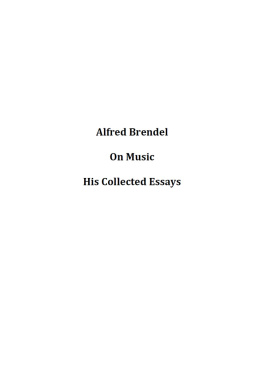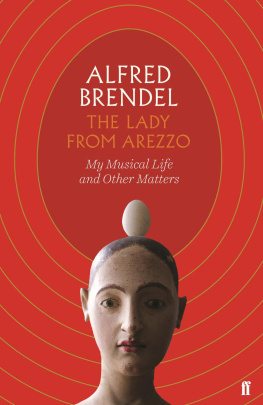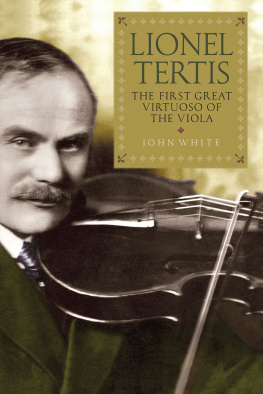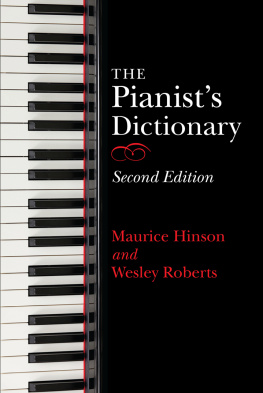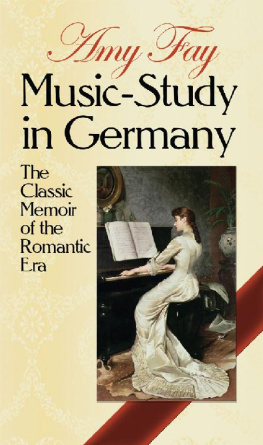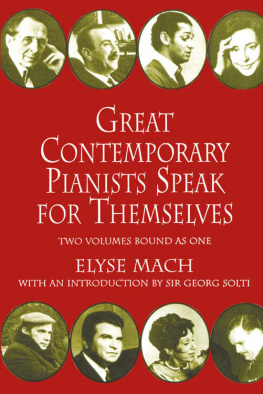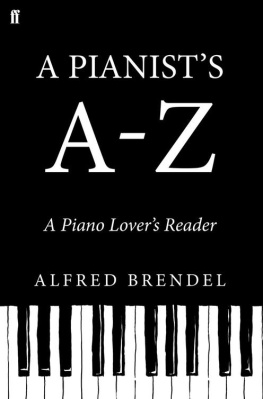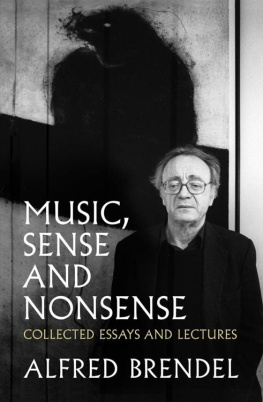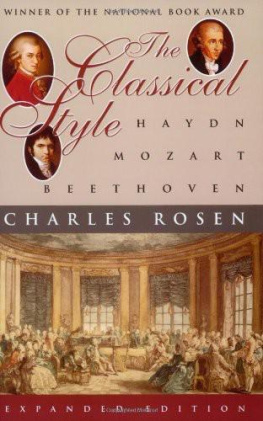

Notes on a Complete Recording of Beethovens Piano Works, Liszt Misunderstood, Liszts Piano Playing, Turning the Piano into an Orchestra, Fidelity to Liszts Letter?, A Peculiar Serenity, Arlecchino and Doktor Faust, Edwin Fischer: Remembering My Teacher and Coping with Pianos were translated from the German by Paul Hamburger. A Mozart Player Gives Himself Advice, Form and Psychology in Beethovens Piano Sonatas, The Text and Its Guardians, Beethovens New Style, Theme and Variations II, Liszts Hungarian Rhapsodies, Liszts Bitterness of Heart and A Case for Live Recordings were translated by Eugene Hartzell. Minor Mozart was translated by William Kinderman, Musical Character(s) in Beethovens Piano Sonatas by Mark Evan Bonds. All the other essays were written in English or translated from the German by myself.
The lecture on Form and Psychology in Beethovens Piano Sonatas was first given in German at Professor Harald Kaufmanns Institut fr musikalische Wertungsforschung in Graz in 1969, and in its English version at the 1970 Dartington Summer School. Musical Character(s) in Beethovens Piano Sonatas was given at Cologne University in 1998 as On Character in Music. Must Classical Music Be Entirely Serious? was delivered as the Darwin Lecture at Cambridge University in 1984; Schuberts Last Sonatas, in an abridged version, as the Edward Boyle Memorial Lecture at the Royal Society of Arts, London, on 30 November 1988. Schuberts Piano Sonatas, 18221828 was given at the Santa Fe Chamber Music Festival in 1973.
In a similar or considerably divergent form, the following articles were previously printed:
A Mozart Player Gives Himself Advice in The New York Review of Books, 27 June 1985; in Die Zeit (Ermahnungen eines Mozartspielers an sich selbst), 15 November 1985; as an accompaniment to a Philips boxed set of the Mozart Piano Concertos, 1990.
Minor Mozart (Mozart fr die Klavierstunde) in Frankfurter Allgemeine Zeitung, 19 October 1991.
Notes on a Complete Recording of Beethovens Piano Works (Anmerkungen zu einer Gesamtaufnahme der Klavierwerke Beethovens) in Hi Fi Stereophonie, Karlsruhe, May 1966.
Form and Psychology in Beethovens Piano Sonatas in Music and Musicians, London, June 1971.
The Text and Its Guardians as an accompaniment to a Philips boxed set, 1983.
Musical Character(s) in Beethovens Piano Sonatas (Gehrte Seelen und Landschaften) in Frankfurter Allgemeine Zeitung, 26 October 1996; in Beethoven Forum vol. 9, University of Nebraska Press, 2001, in The New York Review of Books.
Beethovens New Style as a sleeve note for Philips, 1976.
Schuberts Piano Sonatas, 18221828 as an accompaniment to a Philips boxed set containing my recordings of Schuberts later piano works, and, simultaneously, in Hi Fi Stereophonie Karlsruhe, June 1975; it was also used as the basis for a BBC discussion with Stephan Plaistow in 1974.
Schuberts Last Sonatas in The New York Review of Books, 2 February 1989; in the Royal Society of Arts Journal, London, June 1989.
A Footnote on the Playing of Schuberts Four-Hand Works as a sleeve note for a set of Erato records of Imogen Cooper and Anne Quefflec, 1978.
Testing the Grown-Up Player: Schumanns Kinderszenen in Musica, September/October 1981.
Theme and Variations II as an accompaniment to a Philips recording of Schumanns Symphonic Etudes and variation works by Beethoven, 1991.
Liszt Misunderstood (Der missverstandene Liszt) in Phono, Vienna, 1961.
The Noble Liszt in The New York Review of Books, 20 November 1986.
Liszts Annes deplerinage I and II for the programme accompanying a performance at the Royal Festival Hall, London, on 2 February 1986.
Liszts B minor Sonata as a sleeve note for Philips, 1981.
Liszts Hungarian Rhapsodies as a sleeve note for Vanguard, 1968.
Liszts Bitterness of Heart as a sleeve note for Philips, 1980; in The Musical Times, London.
A Peculiar Serenity (Busoni, Vollender des Klavierspiels) in sterreichische Musikzeitschrift, Vienna, 1954.
Arlecchino and Doktor Faust in Die Presse, Vienna, 23 April 1966.
Superhuman Frailty in The Times Literary Supplement, London, 13 June 1986.
On Playing Schoenbergs Piano Concerto in The New York Review of Books, 16 February 1995.
Wilhelm Furtwngler in Die Zeit, 13 November 1979; in The New York Review of Books, 28 March 1991.
Remembering My Teacher (Edwin Fischer zum Gedenken) in sterreichische Musikzeitschrift, Vienna, 1960.
Coping with Pianos (Vom Umgang mit Flgeln) in Hi Fi Stereophonie, Karlsruhe, December 1974.
A Case for Live Recordings (In Favor of Live Records) Hi Fidelity, May 1984.
On Recitals and Programmes (Das Konzert bin ich) in Frankfurter Allgemeine Zeitung, 27 October 1990; (The Pianist and the Program) in The New York Review of Books, 22 November 1990.
From Analysis to Zubiaurre in The Sunday Times, London, 22 February 1981.
Werktreuean Afterthought, Liszt and the Piano Circus, Liszts Piano Playing, Turning the Piano into an Orchestra, Fidelity to Liszts Letter?, Afterthoughts on Busoni and Afterthoughts on Edwin Fischer were first published in Musical Thoughts and Afterthoughts, 1976.
Jeremy Siepmanns interview originally appeared in Music and Musicians, London, December 1972; it is reprinted here in a slightly abridged version. The interview with Terry Snow was the accompanying text for a Bach record issued by Philips in 1977. The interview with Konrad Wolff appeared in The Piano Quarterly in 1979. Although the form is not that of an essay, I decided to include them because they make a number of points that I considered to fall within the scope of this book.
My thanks go to all the publishers concerned, as well as to Mr. Lawrence Schoenberg, who kindly gave permission to quote from Arnold Schoenbergs notes on Busonis Entwurf einer neuen sthetik der Tonkunst.
Why should a musician with an active and absorbing career bother to write about matters of his trade? To explain himself is the least of his worries. Rather, he would like to clarify his own thoughts and articulate his perception for his own benefit. When advice is given it is aimed first and foremost at himself, if not without the hope that it may be of some value to others. Accordingly, unnecessary complications of jargon are avoided, following Albert Einsteins admirable maxim that everything should be made as simple as possible, though not simpler.
Next to my involvement with music, I have always been attracted by words. To use them with a modicum of elegance even when dealing with a subject which, supposedly, starts where words end, has remained a challenge. Quite frequently, my essays arose from questions for which the literature available to me did not provide satisfying answers. I shall only mention my investigations of Schuberts piano sonatas, of humour in musica non-subject for some philosophers and colleaguesof the interaction of character and structure, or of Beethovens late style, a concise summary of which, to my amazement, I could not find. Other essays try to present an overview of endeavours I have been associated with, such as recording all, or nearly all, of Beethovens piano works, or the vagaries of programme building. A number of notes for programmes and record sleeves hoped to shed, at least at the time of writing, new light on the works discussed.
Next page
